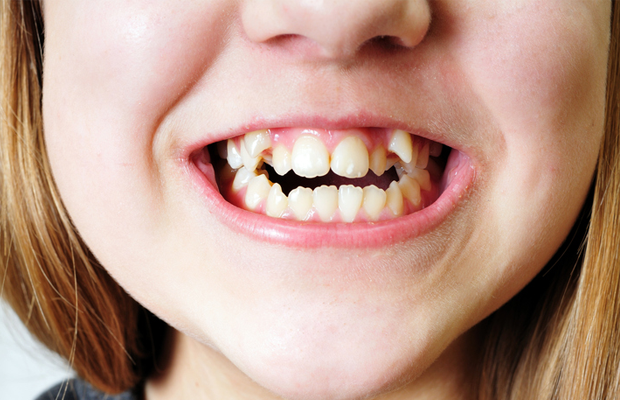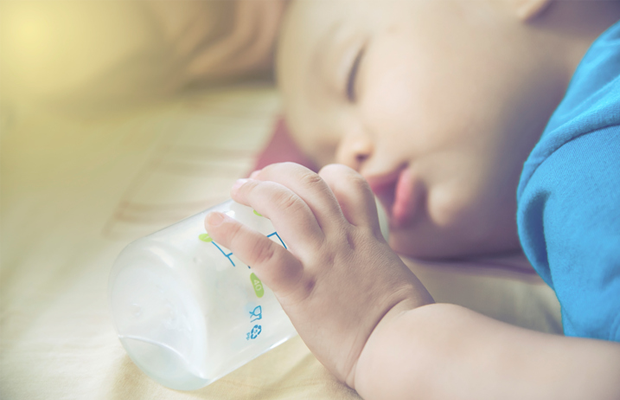Adults should know about the habits that can damage our teeth – biting our nails, not brushing our teeth correctly or using our teeth as a pair of scissors when we can’t open something.
Children, however, don’t always know that a bad habit could be causing damage. Here are some of the more common things that could have a detrimental effect on your child’s teeth.
1. Dummies and thumb-sucking
Sucking is a natural and soothing reflex in babies and toddlers, and finger or thumb-sucking often starts before children are even born. After they are born, thumb- or dummy-sucking can be comforting and, in many cases, can help them (and you) fall asleep.
However, if it continues for too long, it can sometimes interfere with the growth of their mouth and/or the alignment of their teeth.
Young children have soft malleable bones and when there is an object (e.g. their thumb) that is frequently in the way, the bones and soft tissues may start to shape themselves around it, creating a gap where the teeth and/or lips don’t meet up as they should.
Dummies don't usually cause too many issues but you can sometimes see shape changes of the upper lip with prolonged dummy use.
Problems which may arise from thumb-sucking
Prolonged finger- or thumb-sucking may cause an anterior open bite, where the front teeth don’t meet up when the child bites together. Other issues may include:
- Diastema (a gap between the upper front teeth)
- Proclination (tilting out towards the lip) and protrusion of upper front teeth
- Retroclination (tilting towards the tongue) of the lower front teeth
- Retruded mandible (lower jaw which is too far back)
- Posterior cross-bite (back teeth which don’t fit together correctly)
- High, narrow palate, which can in turn affect the child’s ability to breathe through their nose properly
The severity of these will vary according to the frequency, duration, intensity and the position of the finger or thumb in the child’s mouth.
These issues become much more important as the child reaches the age when their adult teeth start to come through.

Does it affect all children?
Not all children are adversely affected by regular thumb-sucking or frequent use of their dummy, but if you or your oral health professional can see there is a problem with their bite, it’s time to start weaning them off the habit.
When should I wean my child off the dummy or thumb-sucking?
The simple answer is as early as possible. Older habits are harder to break, as we all know.
Recommendations from dental experts suggest that you start weaning your child off sucking their thumb or using a dummy as soon as possible, ideally before the age of three.
Many of the early signs of tooth, lip or jaw shape changes may self-correct if the habit is discontinued before four years of age.
Dummies and tooth decay
Remember to follow good hygiene procedures when using dummies to help prevent tooth decay.
As well as affecting a child’s teeth and bite, dummies can cause serious and rapid tooth decay if they are dipped in sugary substances such as honey, jam, sugar, condensed milk or vitamin C syrups.
If you suck your child’s dummy to clean it, there is also a risk of tooth decay by transferring bacteria from your mouth to that of your child.
2. Nail-biting or pencil-chewing
Habits such as these may also affect the alignment of a growing child’s teeth, but not to the same extent as thumb-sucking, as they are not as frequent or done over long periods of time.
However, it is a good idea to discourage your child from biting their nails or chewing pencils.
3. The bedtime bottle
Tooth decay can be caused by what we put in the bedtime bottle. Juice, tea with sugar and several other favourites are all potentially bad for your child’s teeth.

The problem is that the substance is often in contact with your child’s teeth for a long period of time.
The acidity of the drink and/or the sugar/carbohydrate content can also lead to a condition referred to as bottle caries or bottle-feeding syndrome, which involves widespread decay involving many, if not all, of the child’s teeth.
If you put your child to bed with a bottle, experts advise the bottle contains nothing but water – your child does not need nourishment during the night.
4. Teaching your child not to fear the dentist
Dentists are trained to keep you healthy, not just treat you when you are sick.
Many dentists have a particular interest in kids’ dentistry and some even specialise in it.
My simple advice to parents is to bring your children in to meet the dental team at as young an age as possible for a “show and tell play session” as soon as those first few teeth have popped through the gums. Members of the dental team can provide plenty of helpful advice to keep those teeth healthy.

It is better to see kids for the first time when they are healthy, rather than waiting for them to develop a problem. If this happens, their first visit to the dentist may feel like punishment for all those sweets they ate!
We want them to be happy, confident patients, with no reason to fear the dentist in the first place.
Image credits: iStock




 Publications
Publications
 Partners
Partners















